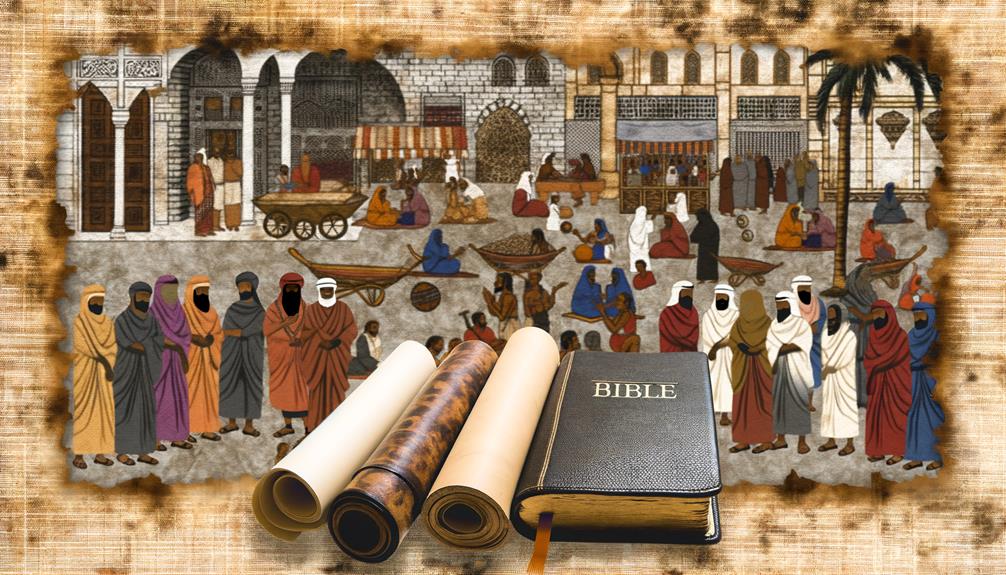187 Meaning in the Bible: Redemption and Renewal
The number 187 in the Bible, when examined through biblical numerology, embodies themes of divine judgment and completion. This interpretation arises from the combined symbolic meanings of its constituent digits: 1 (unity and primacy, as seen in Deuteronomy 6:4), 8 (new beginnings and resurrection, symbolized in Genesis 17:12), and 7 (divine perfection and completion, illustrated in Genesis 2:2-3).
These elements collectively highlight God’s meticulous sovereignty and the fulfillment of divine purposes. By understanding the theological and historical contexts of biblical numerology, one can gain a richer insight into these sacred narratives and their spiritual significance.

Key Takeaways
- Number 187 symbolizes divine judgment and completion in biblical numerology.
- It combines digits 1 (unity), 8 (new beginnings), and 7 (perfection).
- Theological implications highlight God’s sovereignty and meticulous order in creation.
- Reflecting on 187 can deepen spiritual understanding and faith practices.
Biblical Meaning of 187: New Beginnings, Spiritual Perfection, and Renewal
| Interpretation | Meaning | Explanation |
|---|---|---|
| Divine Unity and New Beginnings | The number 1 symbolizes God’s unity, leadership, and new beginnings. | Biblically, 1 signifies God’s sovereignty and a fresh start, encouraging faith in God’s guidance in your life journey. |
| Spiritual Perfection | The number 8 represents resurrection, renewal, and new beginnings. | In the Bible, 8 often refers to new beginnings and renewal, such as the resurrection of Christ, symbolizing spiritual regeneration and abundance. |
| Completion and Divine Order | The number 7 signifies spiritual perfection, completion, and divine order. | Biblically, 7 is seen as a number of completion (e.g., seven days of creation), signifying that God’s plan is perfect and unfolding in your life. |
| Renewal and Spiritual Growth | Encourages embracing spiritual growth and transformation in life’s journey. | The combination of 1 (new beginnings), 8 (renewal), and 7 (completion) signifies entering a phase of spiritual renewal and growth, trusting in divine timing. |
| Faith in God’s Plan | Reflects trusting in God’s perfect and abundant plan for your life. | The number 187 suggests that through faith in God’s leadership and the pursuit of spiritual growth, you will experience renewal and the completion of divine plans. |
Biblical Numerology Overview

Biblical numerology, the study of numbers within the context of Scripture, serves as a profound tool for interpreting the symbolic and theological significance embedded within the biblical text.
This ancient practice highlights how numbers frequently appear in the Bible not merely as quantitative elements but as carriers of deeper, divinely inspired meaning.
Scriptural references, such as the seven days of creation (Genesis 1) and the twelve tribes of Israel (Genesis 49:28), reflect patterns that theologians and scholars have long sought to decipher.
Historically, these numerical patterns have provided insights into God’s design and purposes, offering a structured way to understand His covenantal relationships and eschatological promises.
Consequently, biblical numerology enriches our comprehension of the sacred narratives and theological constructs within Scripture.
Symbolism of Numbers

The symbolism of numbers in biblical texts carries profound theological insights and historical significance, reflecting divine principles and cosmic order.
For instance, the number seven often symbolizes completeness, as evidenced in the creation narrative in Genesis 1:1-2:3.
Numbers such as twelve and forty similarly hold deep scriptural meanings, representing the twelve tribes of Israel (Genesis 49) and periods of testing and transformation (Exodus 24:18), respectively.
Biblical Numerical Symbolism
Throughout the Bible, numerical symbolism plays a significant role in conveying theological truths and divine principles.
Numbers such as three, seven, and twelve are infused with deep spiritual meaning.
For instance, the number three often symbolizes completeness or divine wholeness, as seen in the Holy Trinity (Matthew 28:19).
The number seven signifies perfection or divine completion, evident from the seven days of creation (Genesis 2:2-3).
Twelve frequently represents God’s people or divine governance, as shown by the twelve tribes of Israel (Genesis 49) and the twelve apostles (Matthew 10:2-4).
Understanding these numerical symbols enhances one’s grasp of biblical narratives and their theological implications, rooted in ancient Near Eastern cultural contexts and enriched by centuries of Judeo-Christian tradition.
Numbers in Scripture
Building on the foundational understanding of biblical numerical symbolism, it becomes evident that numbers in Scripture serve as powerful tools for conveying God’s messages and intentions. Each number carries a distinct, profound meaning that enhances our comprehension of divine truths.
| Number | Symbolism | Scriptural Reference |
|---|---|---|
| 3 | Completeness | Matthew 28:19 |
| 7 | Perfection | Genesis 2:2-3 |
| 12 | Divine Authority | Revelation 21:12, 21:14 |
| 40 | Trial and Testing | Exodus 24:18, Matthew 4:2 |
The number 3 signifies completeness, as seen in the Trinity; 7 represents perfection, exemplified in the Creation week; 12 denotes divine authority, reflected in the tribes of Israel and apostles; and 40 symbolizes periods of trial and testing, evident in Moses’ and Jesus’ experiences. Understanding these numbers enriches our scriptural engagement.
Historical Context of 187

Understanding the historical context of the number 187 in the Bible necessitates an examination of its occurrences within scriptural narratives and their corresponding cultural and historical settings.
While the number itself may not appear explicitly within canonical texts, its significance can often be inferred through the numerological traditions of ancient Israel and early Christian communities.
Biblical numerology, deeply rooted in Jewish mysticism and early theological frameworks, often imbued numbers with symbolic meanings.
Historical records and archaeological findings illuminate the sociopolitical and religious milieu wherein these texts were written.
Consequently, comprehending the broader historical and cultural backdrop enhances our grasp of any implicit significance the number 187 might hold, particularly in relation to religious, societal, and ritualistic practices of the time.
Instances of 187 in Scripture

Despite its absence as a literal figure within biblical text, the number 187 is often examined through the lens of biblical numerology and the symbolic interpretations attributed to the amalgamated values of its constituent digits.
In biblical numerology, numbers carry profound significance. The digits 1, 8, and 7 can be individually analyzed: 1 symbolizes unity and primacy (Deuteronomy 6:4), 8 signifies new beginnings and resurrection (Genesis 17:12), and 7 represents divine perfection and completion (Genesis 2:2-3).
Though 187 does not explicitly appear, its composite digits imbue it with layered meaning.
Historically, early Christian scholars, like Augustine, investigated numeric symbolism, influencing contemporary theological perspectives. Consequently, 187, as a composite figure, invites contemplation of unity, renewal, and divine completeness.
Interpretation by Scholars

Many scholars have explored the interpretative significance of numerical patterns in the Bible, drawing upon historical exegesis and theological frameworks to elucidate the potential meanings behind the number 187. Their analyses often examine various dimensions:
- Historical Context: Examining specific periods and events in biblical history where the number 187 appears.
- Scriptural References: Cross-referencing occurrences of the number in different books of the Bible to uncover thematic connections.
These scholarly endeavors aim to provide a deeper understanding of the text, respecting both its sacred nature and historical richness.
Spiritual Significance

The spiritual significance of the number 187 in the Bible can be understood through the lens of Biblical numerical symbolism, which often conveys deeper theological truths.
Reflecting on Genesis 18:7 and its surrounding narratives, scholars interpret these numbers not just as historical markers but as vessels for divine messages.
Such interpretations reveal profound spiritual lessons that underscore the importance of faith, obedience, and divine providence in the biblical context.
Biblical Numerical Symbolism
Biblical numerical symbolism, deeply entrenched in theological tradition and scriptural exegesis, reveals profound spiritual significance and offers a window into the divine mysteries articulated in the Bible. Numbers such as seven, twelve, and forty recur throughout scripture, each carrying theological weight and historical context.
Seven: Symbolizes completion and perfection, as in the creation week (Genesis 1).
Twelve: Represents divine authority and governance, seen in the twelve tribes of Israel (Genesis 49:28).
Forty: Denotes periods of testing and transformation, as with the Israelites’ forty years in the wilderness (Exodus 16:35).
These numerical patterns are not mere coincidences but serve as divine signposts, guiding believers in their spiritual journey and understanding of God’s all-encompassing plan.
Interpretive Spiritual Lessons
Often, the spiritual significance embedded within biblical narratives serves to illuminate deeper theological truths, inviting believers to explore the transformative power of faith in their own lives.
For example, the story of David and Goliath (1 Samuel 17) transcends its historical context to teach about divine strength overcoming human weakness.
Similarly, the parable of the Prodigal Son (Luke 15:11-32) reveals profound insights into God’s boundless grace and forgiveness.
Through these stories, the Bible offers interpretive spiritual lessons that are not merely historical or moral, but deeply existential, guiding individuals toward spiritual growth and a closer relationship with the divine.
Divine Message Interpretation
Frequently, the interpretation of divine messages within the Bible necessitates a nuanced understanding of historical context, linguistic subtleties, and theological frameworks to fully grasp their spiritual significance.
Recognizing the depth of biblical texts requires:
- Historical Context: Understanding the cultural and political environment of biblical times, such as the Babylonian Exile’s impact on prophetic literature.
- Linguistic Subtleties: Grasping the original Hebrew, Aramaic, and Greek languages to uncover layers of meaning not always evident in translation.
Theological Implications

The interpretation of the number 187 in the Bible carries profound theological implications, particularly when examining its scriptural references and historical context. The number, though not frequently encountered, resonates with themes of divine judgment and completion. Theologically, 187 may underscore God’s sovereignty and meticulous order within creation.
| Scriptural Reference | Historical Context | Theological Implication |
|---|---|---|
| Genesis 5:25 | Genealogy of Methuselah | Continuity of divine lineage |
| Psalm 119:187 | Hebrew poetry | Perfection in God’s law |
| Revelation 13:18 | Apocalyptic literature | Judgment and ultimate authority |
| Numbers 14:34 | Wilderness period | Fulfillment of divine prophecy |
| Isaiah 40:31 | Prophetic writings | Strength and renewal |
Understanding 187 enriches our grasp of God’s omnipotence and the intricate design within biblical numerology.
Comparison With Other Numbers

In comparing the number 187 with other significant biblical numbers, it becomes evident that each numeral carries distinct theological and symbolic meanings that contribute to the overarching narrative of Scripture.
Numbers such as:
- Seven: Symbolizing completeness and divine perfection, as seen in the seven days of creation (Genesis 1).
- Twelve: Representing God’s authority and governance, highlighted by the twelve tribes of Israel (Genesis 49) and the twelve apostles (Matthew 10:2-4).
These numbers, rich in scriptural context and historical significance, underscore the multi-layered nature of biblical numerology, inviting deeper exploration and reflection.
Cultural References

In modern media, the number 187 has often been associated with crime and law enforcement, particularly in American culture, which contrasts sharply with any biblical interpretation.
This symbolism has permeated literature, music, and pop culture, leading to a secular redefinition that overshadows its scriptural absence.
Understanding this cultural transformation requires examining the historical context of its usage and the impact it has had on public perception.
Modern Media Influence
Modern media frequently incorporates and reinterprets biblical symbols, including the number 187, reflecting cultural and theological dialogues that resonate within contemporary society.
This dynamic interplay between scripture and media can be seen in various forms:
- Film and Television: Biblical narratives and numerology appear in plotlines, often symbolizing moral struggles or divine judgment.
- Music: Lyrics draw on scriptural themes to communicate messages of redemption, faith, or existential angst.
These cultural manifestations invite audiences to engage with biblical concepts in new, sometimes controversial, ways.
This ongoing dialogue between ancient texts and modern media underscores the enduring relevance of biblical symbols and their capacity to speak to contemporary issues.
Symbolism in Literature
Biblical symbolism, particularly the enigmatic number 187, permeates literature, serving as a profound narrative device that intertwines theological insight with cultural expression. In scriptural contexts, numbers often carry significant weight, embodying spiritual truths and historical realities. The number 187, while not overtly mentioned in canonical texts, has been adopted in modern literature to signify themes of justice, moral consequence, and divine order, reflecting biblical principles.
| Symbol | Literary Interpretation |
|---|---|
| 187 | Justice and moral retribution |
| 7 | Divine perfection and completion |
| 12 | Apostolic authority and unity |
Authors draw upon these rich traditions, embedding biblical symbolism to evoke deeper contemplation and cultural resonance. Consequently, understanding these symbols can illuminate the layers of meaning within literary works.
Music and Pop Culture
Popular music and contemporary culture have co-opted the biblical symbolism of the number 187, transforming it into a potent emblem within various subcultures, signifying themes of mortality, law, and societal order. This number, once a mere numerical passage in scripture, has taken on new life in the lexicon of modernity.
- Lyrics in popular rap songs often reference ‘187’ to symbolize murder or violence, echoing its sinister connotations.
- Street art and graffiti frequently employ ‘187’ as a coded message, resonating with themes of rebellion and social commentary.
This transformation underscores the evolving interplay between ancient texts and contemporary expression.
Modern-Day Applications

Incorporating the biblical significance of the number 187 into contemporary faith practices requires an understanding of its scriptural roots and historical interpretations. To fully appreciate the value of 187, one must also explore the broader context of numbers in the Bible, where each digit often carries its own meaning and significance. For instance, the 921 numerical symbolism in scripture reveals insights into spiritual truths, guiding believers in their daily lives. By recognizing these connections, communities of faith can enrich their worship experiences and foster a deeper understanding of divine messages conveyed through numbers.
Though the number 187 is not directly mentioned in the Bible, numerological methods, such as gematria, can be employed to uncover symbolic meanings. Historically, numbers often convey divine messages or spiritual truths.
For instance, the number 187 could be interpreted through the lens of Psalms 18:7, where God’s power shakes the earth, symbolizing divine intervention and transformation.
Modern believers can meditate on such verses, applying them to personal or communal spiritual growth. Emphasizing the importance of divine presence and intervention, this practice can enrich modern faith experiences, fostering a deeper connection with biblical teachings.
Reflections on 187

Reflecting on the number 187 within a biblical context invites believers to explore its deeper spiritual implications, drawing from scriptural passages and historical interpretations to enrich their understanding of divine messages. Exploring the biblical significance of 531, believers may uncover connections to themes of redemption, transformation, and the unfolding of God’s plan throughout history. By examining the numerical symbolism within the Bible and seeking out the wisdom of spiritual leaders and scholars, individuals can deepen their appreciation for the intricate ways in which God communicates with humanity through numbers and symbols. The biblical significance of 531 may offer fresh insights and revelations that strengthen believers’ faith and inspire them to live in alignment with God’s will.
The number 187, while not directly mentioned in the Bible, can be analyzed through numerological studies and the significance of its constituent digits.
Biblical numerology often reveals layers of meaning:
- 1 symbolizes unity and God’s omnipotence.
- 8 represents new beginnings and resurrection.
Conclusion
The number 187, examined through the lens of biblical numerology, reveals complex layers of symbolism, historical context, and scriptural significance.
Through scholarly interpretation, comparison with other biblical numbers, and examination of cultural references, the understanding of 187 deepens.
Its modern-day applications reflect an enduring relevance.
This exploration underscores the intricate tapestry of numbers in biblical texts, inviting further theological reflection and study.






